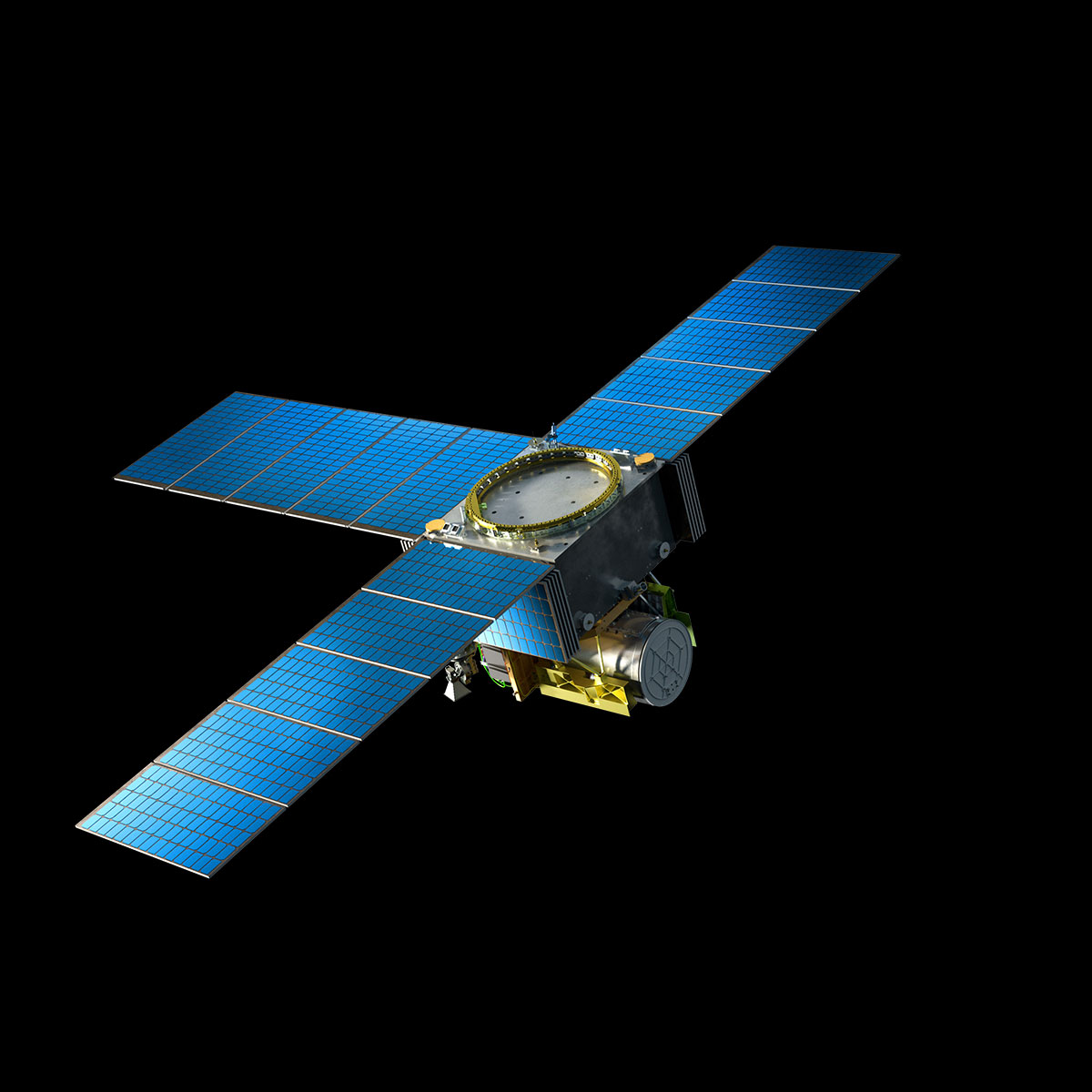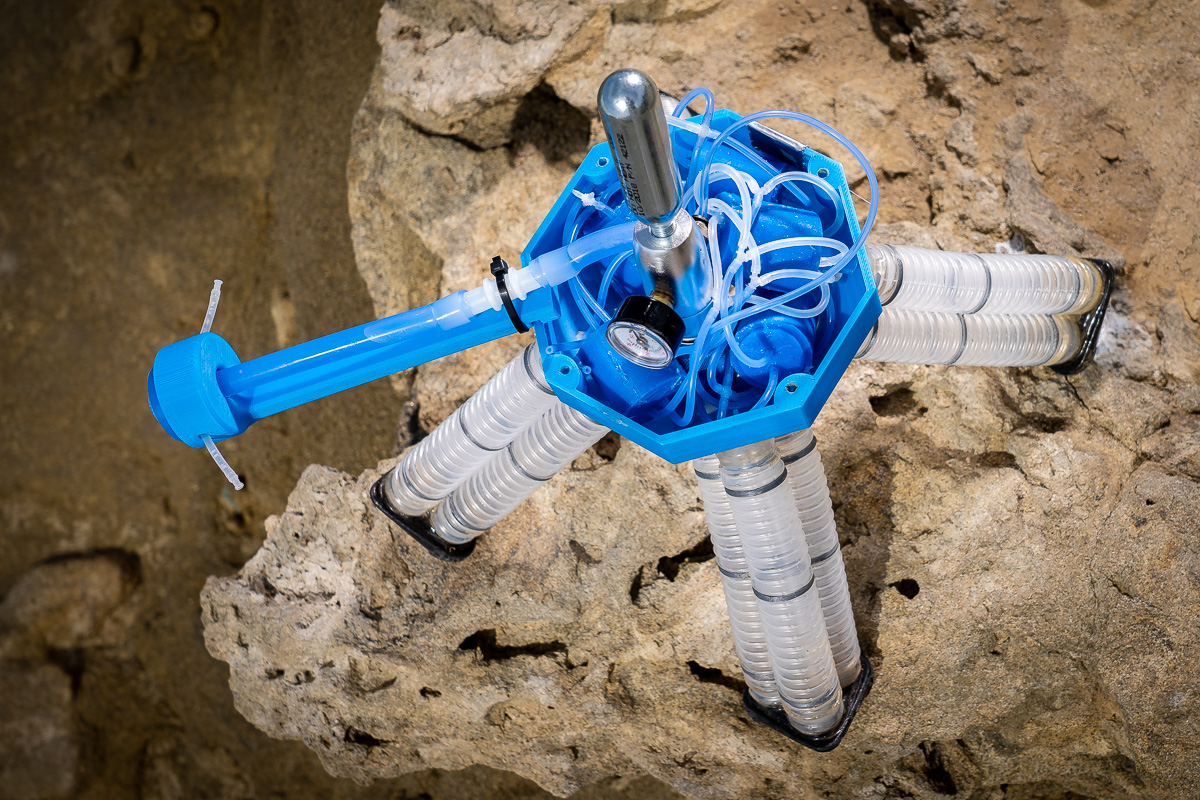Daily Business Report-Feb. 23, 2021
The robot’s walking process is driven by a series of valves. (UCSD photo)
Engineers create robot that doesn’t need electronics
Walking quadruped is controlled, powered by pressurized air
Engineers at the University of California San Diego have created a four-legged soft robot that doesn’t need any electronics to work. The robot only needs a constant source of pressurized air for all its functions, including its controls and locomotion systems.
The team, led by Michael T. Tolley, a professor of mechanical engineering at the Jacobs School of Engineering at UC San Diego, details its findings in the Feb. 17, 2021 issue of the journal Science Robotics.
“This work represents a fundamental yet significant step towards fully-autonomous, electronics-free walking robots,” said Dylan Drotman, a Ph.D. student in Tolley’s research group and the paper’s first author.
Applications include low-cost robotics for entertainment, such as toys, and robots that can operate in environments where electronics cannot function, such as MRI machines or mine shafts. Soft robots are of particular interest because they easily adapt to their environment and operate safely near humans.
_________________________________________________________

General Atomics awards contract to Firefly
Aerospace to launch NASA instrument
General Atomics Electromagnetic Systems (GA-EMS) has awarded a contract to Firefly Aerospace Inc. to launch a GA-EMS-developed Orbital Test Bed (OTB) satellite carrying NASA’s Multi-Angle Imager for Aerosols (MAIA) instrument. The launch vehicle delivering the satellite to space will be Firefly’s Alpha rocket and is scheduled to launch from Vandenberg Air Force Base in 2022.
MAIA’s planned three year on-orbit operation will measure airborne particulate matter in the atmosphere to allow team members to correlate MAIA’s measurements with adverse human health issues such as cardiovascular and respiratory disease, initially focused on 12 primary target areas around the world. MAIA is a Venture-class mission within NASA’s Earth System Science Pathfinder Program at the agency’s Langley Research Center in Virginia. NASA’s Jet Propulsion Laboratory in Pasadena is responsible for the MAIA instrument design, development, and delivery.
Cubic awarded Air Force contract to
deliver P5 Combat Training System pods
Cubic Corporation said its Cubic Mission and Performance Solutions business division was awarded a contract to deliver P5 Combat Training System pods and auxiliary training hardware in support of the Combat Air Force Contracted Air Support (CAS) program.
As part of the program, the U.S. Air Force has contracted private companies that specialize in supplying “Red Air” adversaries to help train U.S. military fighter pilots. Cubic’s P5 pods will allow the adversary air company to meet Air Combat Maneuvering Instrumentation interoperability requirements for training with the U.S. Air Force’s fourth generation fighters and F-35s.
Cubic’s P5 pods will be delivered summer 2021 and will operate on the existing CONUS P5 training ranges. The company expects to deliver more P5 pods at additional operating locations.
Viasat Inc. receives Enhanced Cybersecurity
accreditation from Dept. of Homeland Security
Carlsbad-based Viasat Inc. announced it is part of an elite community of commercial service providers approved to receive cyber threat intelligence through the Department of Homeland Security Enhanced Cybersecurity Services (ECS) program. As an accredited ECS provider, Viasat will receive DHS-provided sensitive and classified cybersecurity threat indicators and information to defend U.S.-based public and private computer networks, including state and local governments, against unauthorized access, exploitation and data exfiltration.
DHS accredited Viasat as one of four companies able to pass stringent ECS program requirements following an audit of Viasat’s cybersecurity capabilities, security architecture and facilities. All DHS ECS service providers must achieve a high standard of security competence and compliance. including maintaining the ability to safeguard sensitive and classified information, and security approvals for personnel, facilities and computer network systems.
USD Math Department receives $4.5 million
award from Department of Defense
The University of San Diego (USD) received a $4.5 million award from the U.S. Department of Defense (DOD)’s Air Force Office of Scientific Research, over a three-year period. Of this amount, the government has allotted $1.5 million in the first year. If the DOD funds the entire program, by extending the research for another two years, this would total $7.5 million and be the largest award to the university. The research funding will benefit the USD Department of Mathematics within the College of Arts and Sciences.
Dr. Michael Shulman, associate professor of mathematics at USD, applied for the grant which will, essentially, research the theoretical foundations of computer programming that helps mathematicians verify their work by checking mathematical proofs, and therefore, provides confidence in the correctness of a theory.
San Diego pays top dollar and near-top dollar
for hotels to house the homeless
The city of San Diego appears to have paid above-market rates for the two Residence Inn hotels it purchased late last year for just over $106 million, properties that city officials are relying on to help reduce the homeless population across the community.
According to an analysis of sales data obtained by The San Diego Union-Tribune, the Residence Inn Mission Valley cost taxpayers $67 million — not including a $502,000 broker’s fee paid by the buyer — or just under $349,000 for each of 192 rooms.
That was the highest per-room cost for any hotel sold in San Diego County last year — and it was based on a valuation that was set weeks before the global coronavirus pandemic wreaked havoc on the hospitality industry.
Tens of thousands of community college students
still taking unnecessary remedial classes
CalMatters
A 2017 law (AB 705) started to phase out remedial courses at community colleges, but while there’s been progress, many students still end up taking classes experts say they don’t need.
Twenty-two percent of first-time students took remedial math courses in 2019, the latest year for which data is available, and more than half of California’s community colleges offered more than a fifth of their introductory math classes at the remedial level. Some colleges even offered more remedial courses than the year prior, according to a December report from the California Acceleration Project.
The remedial courses are also an equity issue: Black and Latino students were more likely than white and Asian students to take remedial math courses.
Scientists design potential drug
for triple-negative breast cancer
Scientists at Sanford Burnham Prebys Medical Discovery Institute have designed a next-generation drug, called SBP-7455, which holds promise as a treatment for triple-negative breast cancer—an aggressive cancer with limited treatment options. The drug blocks a cellular recycling process called autophagy, which cancer cells hijack as a way to resist treatment. The proof-of-concept study was published in the Journal of Medicinal Chemistry.
“Scientists are now learning that autophagy is one of the main ways that cancer cells are able to survive, even in the presence of growth-blocking treatments,” says Huiyu Ren, a graduate student in the laboratory of Nicholas Cosford and first author of the study. “If all goes well, we hope this compound will stop cancer cells from turning on autophagy and allow people with triple-negative breast cancer to benefit from their treatment for as long as possible.”
MiraCosta College student selected
for Future Travel Nurse Scholarship program
Karilyn Brayall, a student at MiraCosta College, has been selected in Aya Healthcare’s third annual Future Travel Nurse Scholarship program, and will receive a $1,000 scholarship to help with nursing program costs. She is one of 10 persons selected.
“Nurses have been integral in the fight against the COVID-19 pandemic, putting themselves in harm’s way to provide care to communities across the country,” said April Hansen, executive vice president of workforce solutions and clinical services at Aya Healthcare. “As the U.S. continues to face a nursing shortage, the painful need for more nurses has never been more evident than this past year. We’re honored to help fill those gaps by supporting these incredible future nurses.”
San Diego City College to expand
help for veterans with their taxes
San Diego City College (SDCC) announced the launch of new initiative to expand help for local Veterans to provide free tax preparation services for low-income veterans in San Diego. This is a collaborative effort with Home Start and made possible with support from Citi.
From Feb. 12 through April 15, SDCC’s Volunteer Income Tax Assistance (VITA) tax center and Home Start’s VITA Program will offer free virtual services specifically targeting veterans to ensure eligible filers receive their Earned Income Tax Credit. (
The San Diego City College Volunteer Income Tax Assistance (VITA) tax clinic program staff will lead the Veterans “Peer-to-Peer” EITC efforts, with support from Citi, to expand services into the veteran population. The VITA site offers free tax help to people who generally make $57,000 or less, military, persons with disabilities, and other eligible taxpayers who need assistance in preparing their own tax returns. IRS-certified volunteers provide free basic income tax return preparation with electronic filing to qualified individuals.



